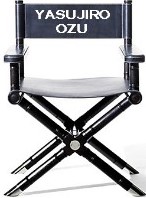 |
 |
Yasujiro Ozu is often labeled by film scholars as the greatest filmmaker of all time. His films dealt primarily with the dynamics of middle-class Japanese family life and the subtle conflict between generations. Universal themes examining parent/child communication were prevalent in many of his gentle social dramas. Ozu, ironically, had no direct personal exposure to this familial lifestyle remaining a lifelong bachelor. He is most recognized for his meticulous static-camera style which centered almost entirely on detailed composition. He minimized all camera movement giving his characters an unencumbered field of expression which allowed more intimate viewer bonding through his often simple narratives. With occasional shots of trains, clocks and elevated hydro-electric lines, Ozu subtly broached the conflict of an encroaching modern displacement upon the established traditional lifestyle. Defining the intricacies of Japanese culture Ozu's cinema is credited for capturing the essence of "mono no aware" - that we experience the wholeness of life by encountering things (mono) and being sensitive to them (no aware). |
|
|
||
|
Suggested Reading (click cover or title for more info) by Donald Richie |
Tartan Boxset # 1 Tartan Boxset # 2 Tartan Boxset # 3 Eclipse Volume 3 - Late Ozu Eclipse Series 10 - Silent Ozu - Comedies Eclipse Series 42 - Silent Ozu - Three Crime Dramas
Director - Feature filmography and Review links: An Autumn Afternoon (1962), Early Autumn (1961), Late Autumn (1960), Floating Weeds (1959), Good Morning (1959), Equinox Flower (1958), Tokyo boshoku (1957), Early Spring (1956) , Tokyo Story (1953) , Flavor of Green Tea Over Rice (1952), Early Summer (1951), The Munekata Sisters (1950), Late Spring (1949), A Hen in the Wind (1948), The Record of a Tenement Gentleman (1947), There Was a Father (1942), The Brothers and Sisters of the Toda Family (1941), What Did the Lady Forget? (1937), The Only Son (1936), An Inn in Tokyo (1935), A Mother Should be Loved (1934), A Story of Floating Weeds (1934), Passing Fancy (1933), Dragnet Girl (1933), I Was Born But... (1932), Tokyo Chorus (1931) , Walk Cheerfully, (1930), That Night's Wife (1930) |
|
